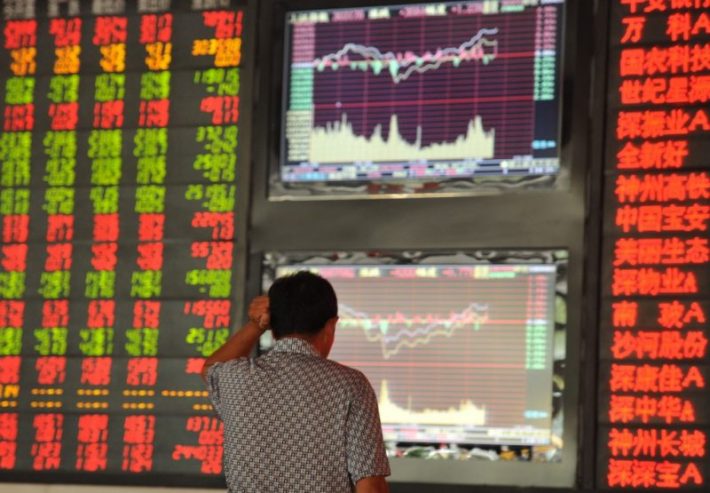Investors in Chinese stocks were cheering again on Monday as markets in Hong Kong and mainland China continued a blazing rally. But the mood in Japan was sombre, as the Nikkei headed in the other direction.
Mainland China stocks enjoyed their biggest single-day gains in 16 years, with domestic A-shares achieving their highest ever turnover, after Beijing rolled out further stimulus measures for homebuyers and consumers to reinvigorate the economy.
Benchmark indexes in mainland China began the week on a solid footing after clocking their best weekly performance in nearly 16 years on Friday, with the CSI-300 blue-chip index last up more than 6.22%. The Shanghai Composite Index jumped 5.7%, while Hong Kong’s Hang Seng Index rose 3.34%.
ALSO SEE: China’s Bid to Lift Household Consumption ‘Will Take Years’
Property stocks soar
Shares of China’s property developers soared, with broad double-digit gains on Monday, as investors cheered easier home purchase rules in major cities and Beijing’s latest burst of stimulus to boost confidence in the depressed sector and the economy.
Late on Sunday, China’s central bank said it would tell banks to lower mortgage rates for existing home loans before October 31, as part of sweeping policies to support the country’s beleaguered property market.
Adding to efforts to reverse the property downturn, Guangzhou city announced the same day the lifting of all restrictions on home purchases, while Shanghai and Shenzhen eased curbs on buying.
“The market is still surprised by China’s policy support and momentum is still continuing,” said Kenny Ng, strategist at China Everbright Securities International in Hong Kong.
Mainland-listed property stocks advanced 6.4%, while the Hang Seng Mainland Properties Index charged 8.4% higher.
Analysts said higher interest rates could be a more challenging economic environment for corporations and individuals, while a stronger yen could hit large export-oriented companies’ earnings.
Still, investor optimism drove up property stocks, with Shenzhen-based Kaisa Group and Fantasia closed up by 82.6% and 37.8% on Monday, respectively, while major developer Sunac, headquartered in Beijing, rose 55%.
Vanke shares in Shenzhen, and Shanghai-listed Greenland and Poly all rose by 10%.
Meanwhile, shares of consumer staples last traded 7% higher. The smaller Shenzhen index soared 8.2%.
CSI-300 eyes best monthly gain since 2014
For the month, the CSI-300 index was eyeing a gain of more than 18%, its best performance since December 2014.
The Shanghai Composite Index was similarly on track to end September with a 14.8% increase, its most since April 2015.
The Hang Seng Index was set for its best month since November 2022 with a 14.7% rise.
“A coordinated stimulus blitz suggests that China has reached a ‘whatever it takes’ moment with economic risks reaching Beijing’s pain threshold,” Eli Lee, chief investment strategist at Bank of Singapore, said.
“Beyond a short-term rebound, although it is now premature at this point to assess, we cannot rule out that this could be the start of a sustainable bull market if Beijing delivers sufficiently sizeable stimulus to successfully drive a turnaround in macro fundamentals.”
Sunday’s developments were the latest in a slew of aggressive stimulus measures announced by Beijing last week – ranging from outsized rate cuts to fiscal support – in an attempt to shore up its ailing economy. That lit a fire under beaten-down Chinese equities that had been languishing near multi-year lows earlier this month, as investors fretted over China’s growth prospects.
Particularly in a boost for stocks, the People’s Bank of China’s also introduced two fresh tools to boost the capital market, one of which includes a swap programme allowing funds, insurers and brokers easier access to funding in order to buy stocks.
The CSI-300 index soared nearly 16% last week in the wake of the announcements and the broader Shanghai composite jumped nearly 13%, both scoring their biggest weekly gains since November 2008. The Hang Seng Index also delivered its biggest weekly rise since 1998, and fifth largest in the last half-century.
Nikkei plunges 4.8%
Meanwhile in Tokyo, the Nikkei plunged by close to 4.8% on Monday after a vote on Friday saw Shigeru Ishiba become the new president of the Liberal Democratic Party leader and likely the next prime minister tomorrow.
Ishiba is seen as relatively hawkish and not inclined to prime the economic pumps, the Japan Times said, which noted that he has said he will not attempt to interfere in the Bank of Japan’s plan to steadily increase rates.
In the run-up to the vote, the share index was close to the 40,000 level, but was back below 38,000 as investors assessed Ishida’s political win.
At the close of trading on Monday, Toyota had fallen 7.85%, Hitachi was down 6.36% and Mitsubishi Estate 8.8%, while Isetan Mitsukoshi plunged 10.6% and SoftBank dropped 7.5%.
- Reuters with additional editing by Jim Pollard
NOTE: The headline, subhead and 2nd paragraph of this report were amended in an update on Sept 30, 2024.
ALSO SEE:
Chinese Banks Will be Told to Cut Mortgages by End-Oct: PBOC
Former Defence Minister Shigeru Ishiba to be Japan’s Next PM
China Set to Issue $284bn in Special Bonds to Lift Economy
Russia Secretly Building War Drones in China, EU Intel Says
China’s Top Cities Set to Lift All Curbs on Homebuyers
China Central Bank Stimulus Moves ‘Broad But Underwhelming’
China’s Property Debts Seen Weighing Down Economy for Years
























